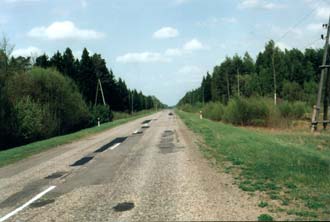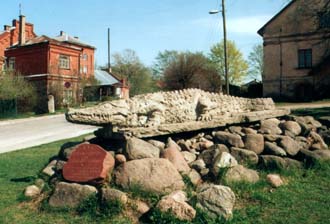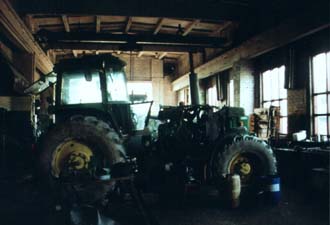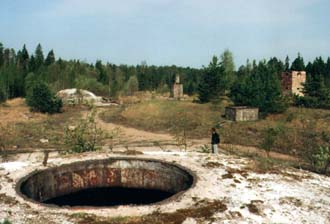Latvia
To enter Latvia was like driving out of a forest and into a farmers field. A few windmills did their job, and I turned left at the first corner heading for Mazsalaca where you allegedly turn into a werewolf when crawling through a specific tree root at full moon while saying a certain spell. And it would be full moon that night.

It was overclouded but I was confident that the moon would be somewhere up above anyway. After dark a squad of kids on bicycles showed me the way into the forest, taught me the magic words, and they watched with scepticism as I crawled and chanted like a fool. Nothing happened. I later got to know - and this is true - that it was a lunar eclipse that evening. That, of course, explains why it didnt work. Bad timing placed me in the Riga morning rush. Traffic was a mess. A brief encounter with some unfriendly Internet café staff made me go on to Jurmala hoping that the beach resort would offer more affability. But nobody would smile to me there either. The only one approaching was a beggar with one leg and beard like Santa Claus. John Lennon is Latvian, he said with his palm set to receive payment for the information. No, John Lennon was English, and he is dead. For a second the guy seemed shocked by the news, then concentrating hard. Eh Suzi Quattro is Latvian. Give me money.
While pushing for the more rural Cape Kolka I tried to name a famous Latvian but couldnt think of any. The cape was windy with neoprene suits and kites, and barely south was the Dungada village. A three meter long crocodile was on display by the main street. In Estonia they had stamps with rhino images, and now this. It was disturbing. Did African wildlife rule the Baltics? The locals kept their distance and refused to be asked, but a plaque explained that the ugly crocodile was given by a Latvian consulate in honor of a Dungada hero named Arvids von Blumenfelds. During WWII he escaped to Australia where he made a reputation as an outstanding crocodile hunter. Many years later a blockbuster film was made based on his character. So there you go, a famous Latvian, Mr. Crocodile Dundee.

The unsociability continued. I crisscrossed the inland, often stopping in towns and villages to seek information about what was there or ahead, but only the beggars made contact. Clearly the ordinary men and women looked upon me as an intruder of their everyday life. With a little open-mindedness the phenomenon might be explained by a collective embarrassment for not speaking perfect English. They might choose to avoid the awkwardness. In such case the rural Latvians are not alone in the world. But at the time it was annoying. A long day with rejections had made its toll on me and I was eating what I in fury had decided to be my last meal in Latvia, a gas station steak, when Ulf rushed in. The Dane was thrilled for finally meeting a Scandinavian biker. Six years ago he bought a large piece of land that had not been grown since before the war, so when ploughing the soil there would now and then surface an undetonated bomb. After six years he had a pile of them. Obviously he was some kind of stuntman farmer. But hey, cheap production costs combined with good corn prices in Denmark was an excellent incentive. Despite being the villages largest and richest employer the bachelors home was in desperate need of a woman touch. At night I had to position my madras so that it covered the nearby holes in the living room floor, so to avoid putting a hand into a hole while sleeping (there were rattraps in all of them). 
I thought about an early start, but Ulf insisted we went for a drive. He had something to show me and told a fascinating story on the go. In the fifties 3000 Russian soldiers came out of the blue and moved into the woods next to the village. There they did something for thirty years, and all that time the locals didnt know what it was. Nobody would tell them. Suddenly the soldiers torched whatever they hid, left as abruptly as they came, and the village people walked together into the woods hoping to get some answers to the three decades of utmost secrecy. 
